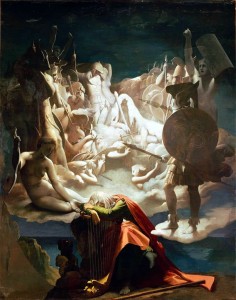 The Poems of Ossian were in their day one of the most influential works of the romantic movement. Collected from oral storytellers by the scholar James Macpherson in the Scottish western highlands and islands, the poems relate the exploits of the legendary Gaelic figure Fionn mac Cumhaill in their Scottish rather than Irish forms.
The Poems of Ossian were in their day one of the most influential works of the romantic movement. Collected from oral storytellers by the scholar James Macpherson in the Scottish western highlands and islands, the poems relate the exploits of the legendary Gaelic figure Fionn mac Cumhaill in their Scottish rather than Irish forms.
Only they don’t, as they were more or less completely faked.
At least, that’s the agreed conclusion after two centuries of delving by Gaelic scholars. True, there was a heated argument for and against their authenticity up to a point – but eventually the weight of evidence grew too great, and the general conclusion was that James Macpherson had just gone ahead and faked the entire thing.
Strangely enough, the poems in their ‘translation’ are actually quite good. Napoleon allegedly carried a French translation with him as his favourite book. They’re worth reading. But what of James Macpherson? In the 1839 edition of his work, after his passing, he is introduced in one of those passages you sometimes get before a famous work. Was he a pleasant fellow, a grinning schoolboy jester who pulled a prank on the literary establishment? Not so much. Here’s some excerpts from the introduction to the work:
Mr. Macpherson was tall, robust, clumsy and ill-favoured in his person, coarse in his appetites, unpolished in his manners, and loose in his morals. He was never married, but was engaged in a round of low amours. His memory may be regretted by a few, but must be execrated by the greatest part of his associates.
Cunning was a leading figure of Macpherson’s character. It is asserted, that when he was engaged in support of the administration, and acted as intermediate between ministers and the persons who advocated their acts, the labours of their pens were presented as his own, and he reaped the reward of those talents which were exerted by his friends. He had the address to retain these coadjutors for a number of years in a state of dependence, feeding their expectations by procrastinated promises, the delusion of which was dissipated only by his death.
One doubts one would quite get away with such a description now, even for the dead. That ‘hated’ was insufficient and Macpherson must be ‘execrated’ is a beautiful turn of phrase. How many introductions to literary works and folk traditions describe the author as ‘execrated’ and ‘cunning’?
If it is of any interest, the Thomas, Cowperthwait & Co. 1839 edition is worth reading both for the introductory discourses and for the ‘mythic poems’. The discourses, dissertations and discussions occupy the first 124 pages of a 400 and some page tome. Nearly a third is introduction, where differing authors argue for and against the veracity of the poems. It’s a fascinating example of a literary scandal that feels strangely modern but happened nearly two hundred ago. You can hear the outrage in the voices. Even if the poems are perhaps very good, that they are not genuine undermines them somehow. I’m reminded of some of the autobiographical novels of more recent times that turned out to be not very autobiographical and the outcry that followed. The story may be well told and deeply enjoyed – but the revolt against the author suggests something much deeper than mere quality of the tale is at stake. The cynical part of me thinks that some (or many) readers, lacking an ability to suspend disbelief or a deep trust in their own or other people’s imagination, actually need to be tricked into thinking a work is ‘real’ (whatever that means) before their disbelief brain muscles can fully relax and allow them to enjoy a rousing story.
I think this links to the idea that ‘true stories’ are somehow more digestible for more people than a clearly invented tale. It is as if, unconsciously, we have been taught by a twisted off-sprout of the puritan ethic that imagination is wrong, and trickery doubly wrong, and imaginative trickery triply wrong.
I cannot say with any certainty why a person might feel a need for the story to be ‘true’ before it can impress upon the mind with all its force, because I do not much feel that urge myself – or more accurately, I feel all fictional stories are true in a manner of thinking. They were true inside the mind of the writer. They certainly represent a truth that the writer is trying to dredge out of their psyche. If there was a preamble of trickery and if you were tricked – well, tricksters are storytellers and always have been. More power to them. And more cunning.

